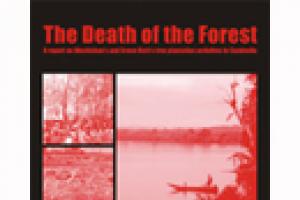Old proposals of damming the Lower Mekong River were revived recently. According to press releases from the Thailand-based NGO TERRA, the governments of Lao PDR, Cambodia and Thailand have granted permission to Thai, Malaysian and Chinese companies, to conduct feasibility studies for up to six large hydro dams on the lower Mekong. Ten years ago the projects had been dismissed for their huge cost and potential environmental damage.
Cambodia
Bulletin articles
16 October 2007
A series of large dams are currently proposed for the Sekong River Basin in southern Laos. In addition to the tens of thousands of people in Laos who would be affected by these projects, the livelihoods of 30,000 people living along the Sekong River downstream in Cambodia are also under threat. Yet the dams are being planned with no consideration of the impact on people and the environment in Cambodia.
Bulletin articles
19 May 2007
Late last year, Norconsult, a Norwegian consulting firm, won a US$1.5 million contract to supervise construction work of the Xeset 2 dam in the south of Laos. Norconsult won the contract, which is funded by the Norwegian Agency for Development Cooperation (Norad), without any competitive bidding.
Other information
24 March 2007
Loss of land and loss of access to natural resources is fuelling a livelihood and economic crisis among Cambodia's rural communities. "People are being dispossessed from their lands by those with political power and money," writes Shalmali Guttal in a recent report for Focus on the Global South.*
Bulletin articles
29 December 2006
Large-scale rubber, oil palm, eucalyptus and pine tree plantations are being promoted by governments in Cambodia, China, Laos, Thailand and Vietnam. However, affected villagers are openly protesting against them. At a meeting held last month in Cambodia we learned that local communities are strongly opposing these plans because they see that these plantations are encroaching on their lands and impacting on their livelihoods.
Other information
29 December 2006
“During our time together, we heard directly from local community representatives from twelve provinces in Cambodia and also from other countries in the region about how their lives, livelihoods and environments are affected by large plantations in their respective areas.”
Other information
29 December 2006
“All villagers understand the need to protect the forest. We can't live without it.” The speaker is a villager from Dak Dam Commune in Mondulkiri province in the north-east of Cambodia. “Now our life is more difficult,” he said.
Other information
30 September 2006
Establishment of monocultures of fast-growing trees to produce so-called fast-wood has accelerated in Cambodia following the country’s transition to a market-oriented economy in the early 1990s. Proposed and established plantations under the development paradigm of ‘economic concessions’ include fast-woods acacia, pine and eucalyptus. The majority of these economic concessions violates Cambodian law and there is little evidence that they create the proposed benefits and income for the state.
Bulletin articles
5 June 2006
A leaked World Bank Inspection Panel [1] report heavily criticises the Bank’s own forest management project in Cambodia for breaking internal safeguards, ignoring local communities and failing to reduce poverty, says Global Witness, a non-partisan international non-governmental organisation --co-nominated for the 2003 Nobel Peace Prize for its work in uncovering how diamonds have funded civil wars across Africa-- focused on the links between the exploitation of natural resources and the funding of conflict and corruption.
Publications
18 March 2006
By the World Rainforest Movement
Proponents of industrial tree plantations argue that the plantations are “reforestation”, increasing the area of forest, providing jobs for local people, or reducing pressure on natural forests. This report examines these companies’ operations in Cambodia, the impacts observed to date on the local populations and the environment, and the associated human rights violations.
Other information
7 March 2006
This month, WRM publishes a new report titled "The death of the forest: A report on Wuzhishan's and Green Rich's tree plantation activities in Cambodia". The report records the impact of two companies' tree plantations on local communities and their livelihoods. For security reasons, the researchers of the report wish to remain anonymous.
2005 was another bad year for democracy in Cambodia. Prime Minister Hun Sen used defamation law suits to arrest or intimidate members of the political opposition, media, trade unions and NGOs.
Bulletin articles
7 March 2006
Contrary to the corporate “mining” approach to forests which invariably implies their destruction, stand out the diverse uses transmitted from generation to generation of indigenous and local communities which have developed a wide and deep knowledge (beyond science) of the forest that have allowed them to benefit from it in a sustainable manner.

